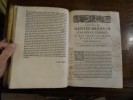3 books for « ossat arnaud d »Edit
-
Topics
Catholicism (1)
First edition (1)
History (3)
Pyrenees (1)
-
Countries
Denmark (1)
France (2)
-
Syndicate
ILAB (2)
SLAM (1)
Lettres de l'illustrissime et reuerendissime Cardinal d'Ossat, Euesque de Bayeux, au Roy Henry le Grand et a Monsieur de Villeroy. Derniere edition. (+) Addition de Quelques lettres... - [16TH & 17TH FRENCH DIPLOMACY]
Paris, Henault, 1627. Folio. In contemporary full calf with six raised bands and gilt lettering and ornamentation to spine. Double gilt line to boarders of boards. Wear to extremities, corners bumped and boards with scratches. Missing small part of lather to capitals. Previous owner's name to title-page in contemporary hand (Ioachim Frederic Basse). Internally nice and clean. 824, (8) pp." 28 pp. (portrait on p. 26).
Later expanded edition of diplomat Arnaud d'Ossat’s letters to King Henri IV of France offering a fascinating glimpse into late 16th and early 17th century politics. Arnaud d'Ossat was a French diplomat and cardinal known for his diplomatic skills and served as the French ambassador to several European countries, including Spain and Rome. He played a significant role in negotiating diplomatic agreements and treaties during his career. D'Ossat was also appointed as a cardinal by Pope Paul V in 1604. His diplomatic efforts were instrumental in maintaining relations between France and other European powers during a tumultuous period in European history. Arnaud d'Ossat served as a trusted advisor and diplomat to King Henri IV of France. Henri IV, also known as Henri of Navarre, was the king of France from 1589 until his assassination in 1610. D'Ossat's diplomatic skills were highly valued by Henri IV, D'Ossat played a significant role in Henri IV's foreign policy, particularly in negotiating peace treaties and diplomatic agreements with other European powers. He was involved in delicate negotiations aimed at ending the conflicts and wars that plagued Europe during that time, including the French Wars of Religion and the broader struggle for power between Catholic and Protestant states. “Cardinal D’Ossat was Henri IV’s representative at Rome, and from a Roman Catholic point of view, a hero in the attempt to reunite Christendom and reconcile Henri with Spain and the Papacy. (…) the letters are gathered as a coherent historical narrative in a book ‘du tout utile & du tout public.’ a book which offers a course of instruction in civil prudence. They exemplify D’Ossat’s moral and political thought: ‘candeur &liberté’, ‘la parfaicte sagesse’, ‘la dexterité admirable qu’il avoit au maniment des affaires’. The reader will not find pages of ‘compliments’ and ‘flatteries’, but ‘un parfait modelle sur lequel tous les ministres des Princes de toute qualité se devront former, soit pour la facon de traitter les affaires de vive voix, ou de les faire entendre par escrit tels qu’ils sont’. They are also, then, literary or rhetorical models. Furthermore, the letters of men such as D’Ossat, men treating the affairs of great Princes, represent the most serious and noteworthy of their actions. These kinds of writing, in short, give ‘l’ame à l’histoire’.” (Jan Papy. ""Self-presentation and Social Identification: The rhetoric and pragmatics of letter writing in early modern times"").
Lettres inédites.. Publiées avec une notice et des notes par Philippe Tamizey de Larroque
Paris, Auguste Aubry, 1872 in-8, 48 pp., broché. Dos factice.
- - VENTE PAR CORRESPONDANCE UNIQUEMENT
Lettres de l'llustrissime et reverendissime Cardinal d'Ossat, Evesque de Baieux, au Roy Henry Le Grand et à Monsieur de Villeroy. Depuis l'année M.D.XCIV à l'année M.DC.IIII.
Paris, Bouillerot, 1624. Petit in-4, plein vélin à rabats de l'époque, titre en noir, 32 pp, 547 pp. Edition originale. Ex-libris manuscrit sur la page de titre. Trace ancienne de tampon sur la page de titre, mouillures claires sur l'ensemble du volume.
Rare édition de ce célèbre ouvrage devenu un classique de la diplomatie. Ossat cardinal et évêque de Bayeux, où il ne résida jamais, aida à la réconciliation entre Henri IV et la papauté.
 Write to the booksellers
Write to the booksellers








